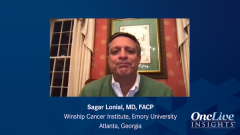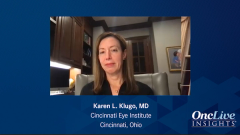
CAR T-Cell Therapy for RRMM
Implications for treating patients with relapsed/refractory multiple myeloma with CAR T cells vs antibody-drug conjugates.
Episodes in this series

Sagar Lonial, MD, FACP: There are a number of different BCMA [B-cell maturation antigen]-targeted therapies that are either in development or available. At the most recent ASH [American Society of Hematology Annual Meeting], there were 2 sets of data updated or presented using CAR [chimeric antigen receptor] T cells to target BCMA. The first we saw was an update of the CARTITUDE-1 study, which is a trial that showed an overall response rate of about 97%. There was cytokine release syndrome [CRS] and a very low grade of neurologic toxicity with that. It required a short stay in the hospital during that period of aplasia and risk for CRS. From what we can tell, it looks like the median progression-free survival [PFS] is a little longer than 2 years, at least on the current analysis that we have there.
The other CAR T cell, and the only other BCMA-targeted approach, that’s currently FDA [Food and Drug Administration] approved is ide-cel [idecabtagene vicleucel], which was approved through the KarMMa study. The KarMMa study used ide-cel [idecabtagene vicleucel] as a CAR T cell in refractory myeloma with a median of 7 prior lines of therapy. It also had a very high overall response rate of over 70%. We also noted that the median PFS was between 11 and 12 months.
What’s interesting about the ide-cel [idecabtagene vicleucel] data is that there are patients who could be on it for a really long time in terms of remission. The advantages of the CAR T-cell approach is that it’s one-and-done, meaning you get all your treatment within that first infusion of CAR T cells. Once you get past the supportive care for adverse events associated with it, there’s no additional treatment. But if you look at duration of response [DOR], ide-cel [idecabtagene vicleucel] is about 11 months and belantamab [mafodotin] is about 11 months as well. The response rate is higher with ide-cel [idecabtagene vicleucel] than it is with belantamab [mafodotin], but it’s certainly an important piece of information to keep in mind.
When we think about how to put all of these things together, they both have pros and cons. CAR T cells have a higher response rate and the potential for a longer response in the absence of ongoing treatment. However, they’re not available at the exact moment that a patient needs them. You have to apherese the patient, you may have to bridge them with additional therapy, and it often takes 4 to 6 weeks for that product to be available to give back to the patient. On the other hand, belamaf [belantamab mafodotin] has a response rate of about 30% and a DOR of about 11 months, but it’s off-the-shelf and available for patients relatively quickly.
There’s no reason to think that you can’t use all of these potential strategies. It’s just a matter of your immediacy and what the patient wants. There are many patients who say, “I don’t want to go in the hospital. I don’t want to risk cytokine release syndrome. I don’t want to do all those things that are associated with a CAR T cell, but I’m willing to come in every 3 weeks and be seen by an ophthalmologist to make sure that if I’m getting belamaf [belantamab mafodotin], it’s being done in a safe and effective manner to maximize how I’m going to be treated overall.” Those are some subtleties that are differences in safety and efficacy between CAR T cells and antibody-drug conjugates, and some things that might help guide us in terms of when to use what agent in which patients and at what time. There are a number of variables that can go into that.
Transcript edited for clarity.







































